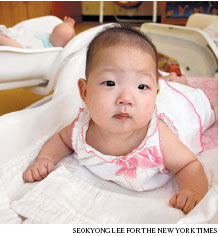South Korea is encouraging domestic adoption and reducing foreign ones.
By NORIMITSU ONISHI
SEOUL, South Korea - Daunted by the stigma surrounding adoption here, Cho Joong-bae and Kim In-soon delayed expanding their family for years. When they finally did six years ago, Mr. Cho chose to tell his elderly parents that the child was the result of an affair, rather than admit that she was adopted.
“My parents later died believing that I’d had an affair,” said Mr. Cho, 48, a civil engineer who has since adopted a second daughter.
Now, as South Korea becomes more accepting of adoptive families, Mr. Cho and Ms. Kim feel they can be more open, with relatives and nonrelatives alike. Ms. Kim, 49, attributed the change partly to the growth of other nontraditional families, like those headed by single parents or including foreign spouses. “We feel attitudes have changed,” she said.
Just how much, though, is the critical question as the government pushes aggressively to increase adoptions by South Koreans and decrease what officials consider the shameful act of sending babies overseas for adoption.
Since the 1950s, tens of thousands of South Korean children have been adopted by foreigners, mostly Americans, because of this country’s traditional emphasis on family bloodlines and resistance to adoption.
But last year, for the first time, more babies here were adopted by South Koreans than foreigners, as the government announced recently: 1,388 local adoptions compared with 1,264 foreign ones. What is more, South Korea has set a goal of eliminating foreign adoptions altogether by 2012.
“South Korea is the world’s 12th largest economy and is now almost an advanced country, so we would like to rid ourselves of the international stigma or disgrace of being a baby-exporting country,” Kim Dongwon, who oversees adoptions at the Ministry of Health, said in an interview. “It’s embarrassing.”
To encourage domestic adoption, the government last year began offering $90 monthly allowances per child for those who adopt children up to 12 years old, as well as more generous health benefits for the children. Even greater health benefits are now given to adopted disabled children.
The government also made it easier for South Koreans to adopt. Single people can now qualify, as well as older ones. In addition, the government has made foreign adoption more difficult by imposing a five-month waiting period before children can even be considered for overseas adoption.
The government’s goal has received much media attention and popular support. But adoption agencies and some adoptive parents and experts say the new policies are concerned less with the children’s welfare than with saving face.
“The government is hung up on numbers and on South Korea’s image,” said Lee Mira, who oversees domestic adoptions at Social Welfare Society, a private, nonprofit organization that is the country’s second largest adoption agency. “When North Korea taunts South Korea by saying we’re selling Korean babies to foreigners, it hurts the pride of South Korea.”
Adoption agencies have conducted campaigns, some featuring movie and TV stars, urging South Korean adoptive parents to tell people how their families were formed in the hope that more openness would lead to less prejudice. The efforts got a boost when some celebrities adopted and went public with the news.
Still, many adoptive parents choose not to share how their families were formed, and some engage in elaborate ruses to pass off the children as their biological sons or daughters.
A couple now living in a suburb of Seoul learned long ago that the husband was sterile. But he was reluctant to consider adoption. In a Confucian society that values bloodlines, he worried that adopted children might face difficulties in their careers or with marriage prospects.
So when the couple decided to adopt three years ago, they chose to fake a pregnancy, as many adoptive parents here do. The couple moved, and the husband, now 43 and a real estate agent, switched jobs. The wife, an employee of a telecommunications company, began wearing maternity clothes over a special pillow, made by a company recommended by the couple’s adoption agency.
All was going well until a colleague the woman had confided in told the secret to a supervisor.
“I was so hurt and embarrassed by that experience,” she said. “I would like to adopt a second child, if only to go through the experience in a proper manner this time.”

